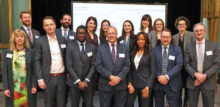The launch event of the Cambridge Impact Framework brought together over 120 asset managers and asset owners, academics, sustainability experts, alongside EU Commission officials, to discuss the opportunities, challenges and next steps to measure investment impacts. The discussions were shaped by three panels. The first provided an overview of the key outcomes of the report, emphasising the need to increase transparency in the investment industry and empower clients to make informed decisions. Lead author of this report, Dr Jake Reynolds highlighted how a common approach to reporting investment impact would improve the credibility of investment managers’ impact claims, allow comparability across funds and build trust along the entire investment value chain.
Head of Impact of Investing at Union Bancaire Privee (UBP), Victoria Leggett said:
“There is increasing demand, especially among millennials and the incoming Generation Z, for reporting social and environmental impact. Ultimately our aim is to help financial consumers – the investing public – choose the services they want based on a fuller understanding of the social and environmental impacts those choices will have.”
The second panel discussed action already taking place from members of the Investment Leaders Group (ILG) to measure investment impacts, with reflections from Emanuelle Fanelli, Senior Responsible Investment manager at Aegon Asset Management, Niamh Whooley, Senior Vice-president ESG at PIMCO and Johanna Koeb, Head of Responsible Investment, at Zurich Insurance. They stressed the sub-optimal state of impact data today and warned that even with the metrics published today, we are still at the very early stages of being able to understand the full sustainability impacts of financial services.
Reflecting on the event Roelie van Wijk, Global Head of Responsible Business & Public Affairs at Aegon Asset Management and also chair of the ILG said:
The ideal metrics are offered as a guide to how impact could be measured in years to come when the investment industry has developed the necessary data infrastructure. The base metrics, even if imperfect, are designed to help nvestors start that journey. Both sets are intended to provide the starting point for objective, comparable, consistent and reproducible results.”
The third panel focused specifically on the opportunities and challenges ahead for policymakers, data providers and industry bodies and how we can work together to build a strong data infrastructure and improve impact measurement. Speaking on the panel, Elia Trippel, Policy officer from DG Fisma, European Commission highlighted the importance of reporting investment impacts in a standardised way, which will allow investors to shift capital towards sectors that can support the sustainability transition. She went on saying that improving corporate disclosure is the very first step that needs to be taken.




